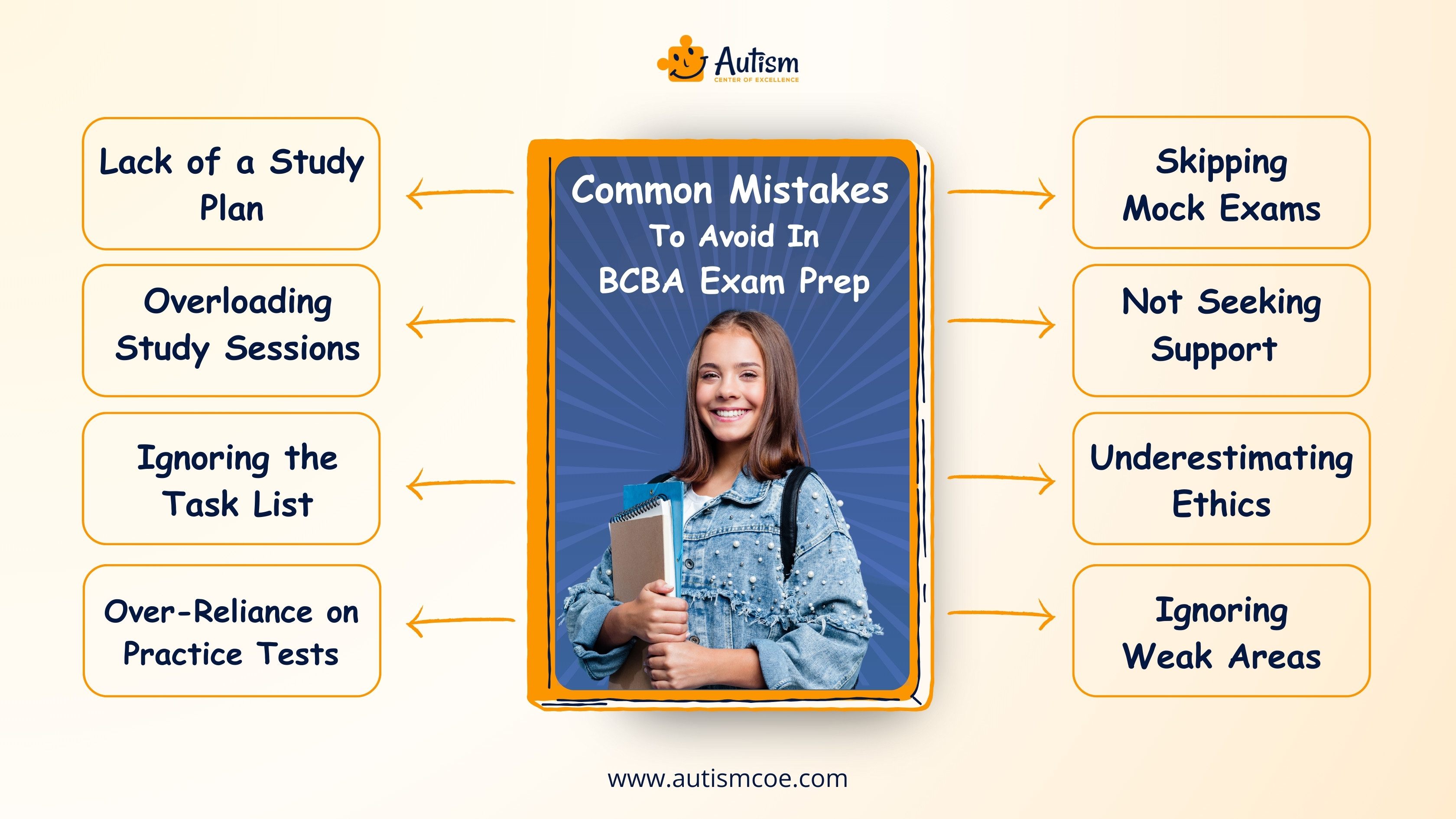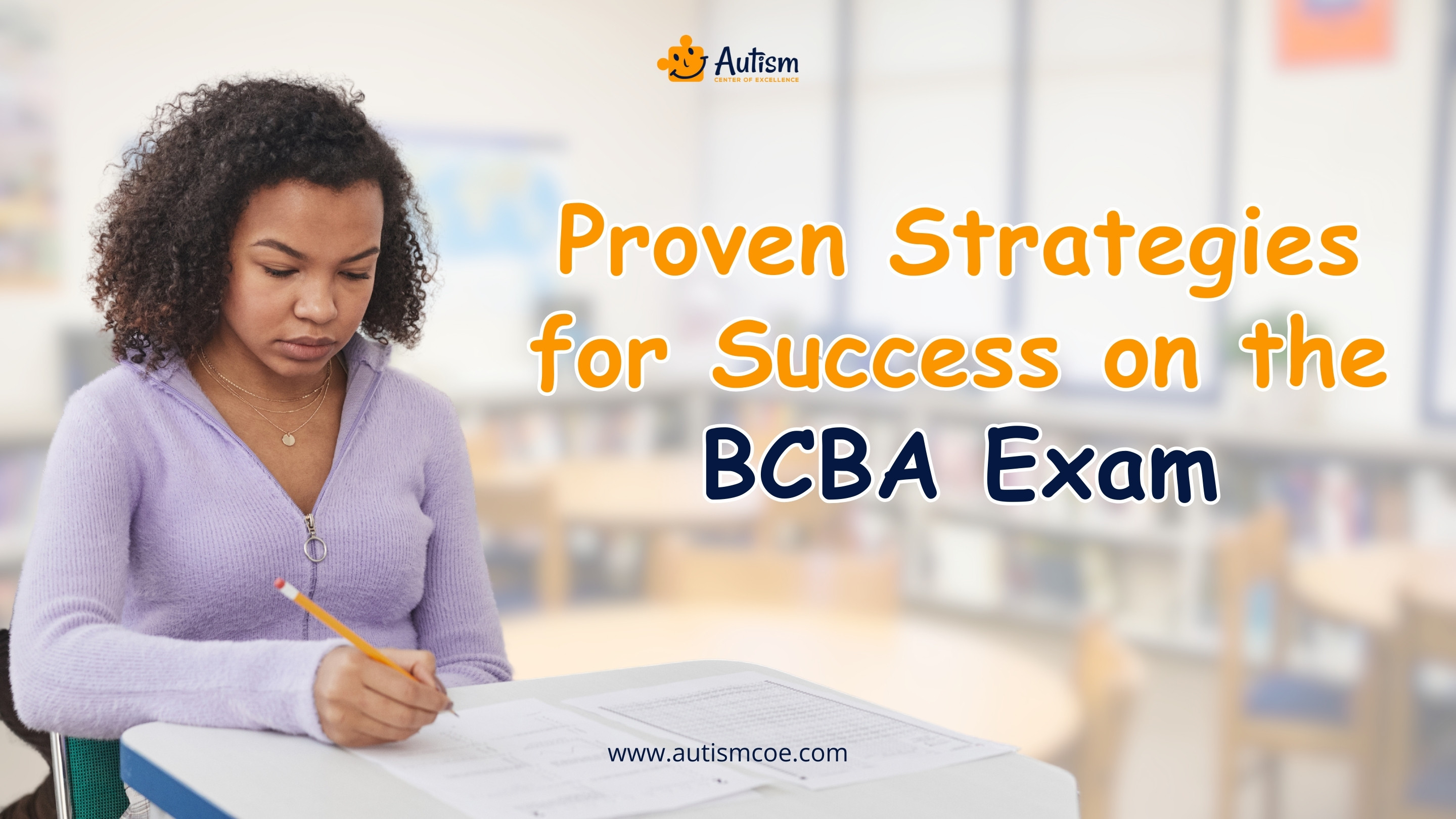High-stakes exams like the BCBA (Board Certified Behavior Analyst) exam can feel overwhelming. It represents the culmination of academic knowledge, practical experience, and dedication to mastering Applied Behavior Analysis (ABA). Simply passing a certification exam is not just a professional achievement but a way forward to grow and help others.
But, that’s where the concept of preparing well comes into play and is not just about mugging up the content. Mistakes in your process will set you back and erode your confidence. Learning and not falling into the most typical mistakes is key to ensuring you are ready for the exam. This article will describe these challenges and, most importantly, provide tips for effective BCBA exam preparation.

Common Pitfalls in BCBA Exam Preparation
Preparing effectively is key to success, but it’s easy to fall into common traps along the way. Here are some mistakes to watch out for and avoid during your study journey.
1. Lack of a Study Plan
Mistake: Lack of a clear and specific plan on how to approach your study sessions is one of the worst things that a BCBA candidate can do. Without guidance, you may miss important things or find yourself rushing at the very last minute.
Solution
Create your own BCBA Study Guide that fits your requirements as a student.
- Check out the BCBA task list, which lists the areas in which you will be assessed.
- Divide the material into a number of parts and set up time limits for each of them. The best way is to be regular, with a schedule that is once a week.
- Use technology to help you stay on track by using Google Calendar or Notion. You need to ensure that you adhere to your plan by scheduling your study time as you would any other appointment.
Having a certain routine helps you to be steady in your preparations and helps to avoid rushing through everything at the last minute before the test.
2. Overloading Study Sessions
Mistake: You might think that the more time you spend studying, the more ready you will be. However, long hours of studying result in exhaustion, mental exhaustion, and poor memory retention.
Solution
Study smart, not just hard.
- Organize your time following the Pomodoro method, which means, studying for 25 minutes and then taking a 5-minute break, and then repeating this cycle four times and taking a longer break.
- Set realistic daily goals. Try to have 2-4 hours of intense work instead of trying to cram everything in one day.
- Be sure to counterwork with rest, food, and exercise, and eat, sleep, and exercise well.
This way, you will prevent energy drain and enhance long-term memory: by taking it slowly and steady. Bear in mind that studying is a long race, and not a short one.
3. Ignoring the Task List
Mistake: The BCBA task list is the definitive guide for the exam, and it is surprising to find that many students barely glance over it, or worse, do not prepare in accordance with it.
Solution
The task list should be your guide.
- The current BCBA task list is also available, which provides the domains and sub-areas you need to learn for the exam.
- Assess your positives and negatives in each area. First, it is recommended to work on the problematic topics more.
- This will help you to compare your textbooks, your flashcards, your ABA study tips, and so on to see that all the task list is covered.
This way you will follow the task list and make sure that your preparation is going in the right direction and is not wasteful.
4. Over-Reliance on Practice Tests
Mistake: Review tests are very effective in preparing for an exam, but focusing on them alone means that you miss out on fundamental knowledge.
Solution
However, do not neglect the practice tests but it is good to understand the concepts.
- Use these practice tests as a way to diagnose your knowledge and not as the only way to prepare for the test. They help you point out areas of weakness.
- Don’t neglect to revisit the questions, even the ones you answered correctly after completing a practice test.
- Add the practice tests to other resources that include textbooks, case studies, and flashcards to gain basic understanding.
While practice tests are useful for evaluation, it is suggested that they should not be used instead of understanding concepts.
5. Skipping Mock Exams
Mistake: Some students don’t prepare for mock examinations as it consumes much of their time, or they dread the outcome. It can result in shocks on the examination day to time control and sitting through the exam.
Solution
Take full-length mock exams to create a real examination environment that will make the student prepare well for the examination.
- It will be advisable to have at least 2-3 full mock exams within the preparation phase. The earlier, the more there will be enough time to get used to the situation.
- Ensure that the conditions are silent and ordered and stick to the formal time duration as it is for real exams.
- Review your results and make changes to your BCBA Exam Study guide.
These mock exams assist you in making yourself tough for a long time and prepare you to undertake the format of the test which reduces the anxiety on the actual day of the test.
6. Underestimating Ethics
Mistake:Ethics in particular tend to be something that can easily be sidelined during BCBA exam preparation, but this area is actually quite important and can be quite tough to crack if you haven’t spent enough time studying for it.
Solution
Put ethics into your priorities in your study plan.
- S biochemical year, set aside particular days to review the Professional and Ethical Compliance Code for Behavior Analysts.
- Ethical principles and how they work in practice can be best explained through the use of case studies.
- To help you remember the ethical guidelines and terms it is recommended to use flashcards.
Learning the code and passing the exam doesn’t necessarily mean you will be an Ethical Practitioner.
7. Not Seeking Support
Mistake: Preparing for the BCBA exam is often a lonely process and many people sit down and attempt to cram for the exam themselves. This results in a loss of motivation, frustration, and most of all missed opportunities to learn.
Solution
Build a support network.
- Participate in study groups, either in the physical world, or on the internet to exchange material and make sure everyone is on track. Some of the popular communities that one can find information about BCBA include Reddit, Facebook, and LinkedIn.
- Get in touch with potential or current BCBA Professionals who can offer support and advice.
- BCBA exam prep courses for instance are usually systematic and could include tutor’s guidance, materials, sample tests etc.
First of all, please do not forget that cooperation and the opportunity to be mentored can greatly influence your preparation.
8. Ignoring Weak Areas
Mistake: Over the years, most candidates tend to concentrate on the areas that they are conversant with and in the process forget the areas they have strength problems that are likely to cost them some points on the BCBA Exam.
Solution
Target your weaknesses.
- To effectively prepare for the exams, try to solve mock tests to know the topics that you are weak at.
- Spend more time on these areas, by dividing them into sub-topics.
- Emphasize your learning by using multiple resources including videos, flashcards, or group discussions.
- Keep a record of your progress, and revisit the topics you have found difficult until they become easy.
Since weaknesses hamper your confidence and the final performance during the exam, working on them is always beneficial.
Enjoying Reading?
Join Our Weekly Newsletters!
Subscribe now to stay updated with our latest email updates.

Effective Study Tips for the BCBA Exam
Besides avoiding the mistakes that have been highlighted here are some tips that can help you improve your BCBA Exam Preparation.
Time Management
Try to concentrate most of your study time on the areas of the test that you are least prepared to answer but still try to cram as much material as possible before the day of the test.
Use Tools and Resources
Of course, there is Quizlet for flashcards, Anki for spaced repetition, and BCBA study guides to keep your learning structure.
Stay Consistent
Coherence is better than passion. Strive to everyday reading, even if it is only half an hour a day.
Track Progress
Give yourself reasons to celebrate as you go through the process – getting a better grip on a specific part of the task list or doing better on a practice test is something to be happy about!
Suggested: How to Study for the BCBA Exam?
Frequently Asked Questions & Answer
Why Do I Keep Failing the BCBA Exam?
Failing the BCBA exam may result from insufficient preparation, ineffective study strategies, or test anxiety. Focus on analyzing past performance, strengthening weaker content areas, and utilizing reliable study resources like mock exams and BCBA task lists.
How Many Times Can You Fail the BCBA Exam?
You can attempt the BCBA exam up to 8 times within a two-year authorization period. After that, you’ll need to reapply and meet eligibility requirements again.
What is the Average Pass Rate for the BCBA Exam?
The average pass rate for first-time BCBA exam takers is typically around 60%-65%. It can vary slightly by year and test version.
How Do I Pass the BCBA Exam for the First Time?
To pass the BCBA exam on your first attempt, follow a structured study plan, focus on the BACB task list, practice with mock exams, seek guidance from study groups or mentors, and manage your time effectively during the exam.
Conclusion
Passing the BCBA Exam doesn’t require sacrifices—it requires effective study strategies. Identifying common pitfalls, such as poor planning, overloading study sessions, and skipping mock exams, can help you prepare more efficiently and set yourself up for success.
Prepare systematically, rely on what you have and on others, and always aim for teamwork. So far, you have come this far, and by applying the tips discussed in this article, you will be in a good place to prepare for the exams. Still need more help with your BCBA exam? Explore our list of BCBA exam study guides. Good luck!
Please Note: The content of this blog is for informational purposes only and should not be considered a substitute for professional medical advice, diagnosis, or treatment. Consult a qualified healthcare professional for personalized guidance tailored to your specific situation.

Bhavika Bhasin
Bhavika Bhasin is the Research and Marketing officer at AutismCOE. She works with children and adults with ASD. Her clinical research includes evaluating various available autism screening and diagnosis methods and their efficacy. She is currently developing a novel screening exam that is indicated to be more accurate than the existing available exams. She is also writes articles papers for various publications.


